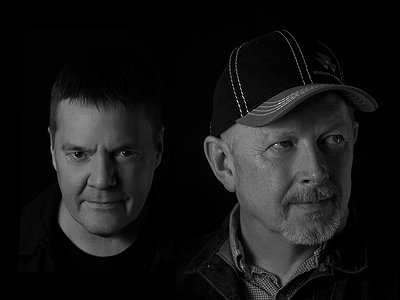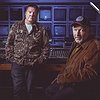Part 2
Could you describe your creative process on the basis of a piece or album that's particularly dear to you, please? Where did the ideas come from, how were they transformed in your mind, what did you start with and how do you refine these beginnings into the finished work of art?
I ll pick the track "Ujala". It's one of the more straight tracks on the album. I love the wonky tracks like "13 13" but there's so much accident and bending in that track …
Anyway "Ujala" - originally titled "Ujala, New Moon & Encore Room" – was a run of restaurants where I grew up and it turned into a chant in my head over a conga loop I made in the studio that morning.I used the TR-8 drum machine for congas, which also doubled up as a bass line. I had recently purchased a learn morse code vinyl record, and tried to fit some of that as another rhythm over the top. But I got a bit frustrated and programmed it in, using a Casio VZ sound - in a more musical way … actually as a conga player might phrase it.
It felt like it needed a horn riff. That was played on the Moog ... There's no real bass, as attempts at bass lines obscured the conga pattern - which kind of did a bass line job. So various attempts at musical layers were built up and abandoned.The groove and the morse code and the brass just seemed to be enough - until a point where we changed the drums to TR 606. They go small and you've got to love the biscuit-tin snare!
Now, giving a different background to the morse code and pads can be introduced. The pads are made in the sampler from layers of my trusted bamboo flute (been using that since 1978) and a bouquet of Spanish cow bells that I bought in Spain every time we stayed at the Mother In Laws' place - you'll spot them in loads of tunes. So we've gone spooky at this point.
The “Fantastic” came from an answerphone message on Andrew's phone. We are always looking for little ‘badges” or “decals” like this with instrumental music. People were always calling in the studio as other projects were running at the same time - Howard Jacobs is a musician I've played with for many years, met him playing bass clarinet in a version of West Side Story above a pub in Huddersfield. He plays classical woodwind but is a Cuban music expert and has studied congas over in Cuba. So I ask if he can do some conga soloing over the front and the whole thing starts to get a nice organic feel. I think he might have put some cabassa on it too.
A few weeks later we did a session for Low Four TV and Howard arranged a six piece brass section for various new 808 pieces - "Ujala" being one. Might release that version at some point.
There are many descriptions of the ideal state of mind for being creative. What is it like for you? What supports this ideal state of mind and what are distractions? Are there strategies to enter into this state more easily?
Having one computer with email and social media where you're workstation is has probably cost me years of concentration. The ideal state of mind for creativity is actually close to reverting to a child like state, being silly, doing something for your self, amusing yourself with daft stuff.
Getting new “toys“ always helps. I find that if I'm in a state of learning a new plug-in or a new instrument, a track will always emerge. The other method is to have a deadline and throw yourself in abject terror at a situation - that can work! Having a gig to do where there is no hiding, that will often throw up a heap of music while your avoiding what you should be doing. I've learnt to be comfortable with this. Making music alongside other people often helps. You can't go off onto You Tube with out being rude.
How is playing live and writing music in the studio connected? What do you achieve and draw from each experience personally? How do you see the relationship between improvisation and composition in this regard?
This is an interesting question. It depends on how comfy you are on stage letting the machines do the talking. When 808 State started touring, especially in the U.S., the music started to be more messy on stage - we had a few tunes that allowed space for improvisation - "Pacific State" being one. When you have played it 700 times, there is a tendency for jazz to creep in. We’ve arranged it various times and each time the arrangement gets consciously more open to improvisation.
"Cübik" is another one – I’m channeling my inner Sonny Sharrock. I love these freedoms and I hope the joy of that comes over. I know some electronica purists absolutely hate it, but they're not there for 30 years doing it.
So back to the studio, most often you’re just thinking about what serves the track you are working on. We reached a point on compiling this album where it became a pure electronic sound world. When doing our last tour and introducing some of the new material, we played some tracks live because they had guitars on and that’s a happy place for me. But they are not on the album. Putting a live set together from a 30 year time line and introducing new stuff is a challenge. You have to think of the whole arc of the show and the punch points. I think we could do 2 types of 808 show at this point … there I go keeping it simple again!
I absolutely love improvising – it’s been part of my life. I still do a lot of random low key gigs out there in the world that fulfill that need (check out "Kicked From The Stars" and "Konstrukt Live at Islington Mill ,The Cult Of St Margarets" with Marshall Allen). But to me composing is just slowed down improvising.
How do you see the relationship between the 'sound' aspects of music and the 'composition' aspects? How do you work with sound and timbre to meet certain production ideas and in which way can certain sounds already take on compositional qualities?
More often than not, it’s a sonic event that starts a composition. How can I frame this interesting sound and sustain a sound world journey? In the past many 808 tracks sound like a journey down a river with the landscape constantly changing. I really love the Bollywood composer RD Burman for his sense of that. There’s a conveyor belt of jeweled sounds passing by in interesting shapes.
I think the music on this new record is still very much about shapes, but its more sculptural. Physical sound with Esher-like twists and an emphasis on textures. It’s the most dance useful record we've done - but not the dancing you normally do. Get your leotard on and watch Gene Kelly films.
Our sense of hearing shares intriguing connections to other senses. From your experience, what are some of the most inspiring overlaps between different senses - and what do they tell us about the way our senses work? What happens to sound at its outermost borders?
I don't know shit about neuroscience, but there are pieces of music that trigger the chemicals so regularly that I'm very intrigued by their elements. I’m obsessed by the great drummers - Elvin Jones, Tony Williams, Cristian Vander, Ronald Shannon Jackson to name a few. Breaking up time and leaning in and out of a pulse is a feeling of flight.
I was learning drums for a few years recently. I know it’s maybe too late to be great at it, but I’ve studied drumming through programming. We had a group a few years back called Toolshed that combined programming and 4 live drummers. Every drummer has a unique fingerprint. I’m pretty obsessed with guitarists as well, everything comes down again to a fingerprint - tone, voice, control, equipment. Sax players especially are unique voices. It still surprises me that some people say they hate sax, when everyone’s sound is different. It’s a spectrum. Synth textures and chordal things can feel like seasonal shifts, they hit you in a different part of the body to the vibrational drum and bass feelings, almost like a sigh or a shudder - Huron was written around that that not.
Art can be a purpose in its own right, but it can also directly feed back into everyday life, take on a social and political role and lead to more engagement. Can you describe your approach to art and being an artist?
Over time, there are pieces of work you can stand by. There are other pieces you wish would disappear. But everything is present on the Internet, all one's triumphs and failures. So the pressure is on to do something truthful and worthy - and knowing that someone might love it dearly, while someone else will take the time to shit on it publicly. It’s probably always been like that. Some of our best stuff was done quickly, with an absent mind and a ton of momentum. Some of my most rewarding musical moments were just a chord at the right moment with the right sound in the right building on the right day and no one else noticed. The most rewarding thing in playing music at people is an emotional empathy - you know when you got one in the back of the net, it’s just an exchanged glance and a knowing nod. A small gig can be as rewarding as a huge crowd. The early rave days were something quite special as a group feeling - the music acted as a conductor for a murmuration of 1000s, a new music, a new social grouping, new connections with new technology, optimum optimism.
I’ve always been amazed at how open people actually are to new music if you can just get that idea across that it’s for everyone. I often quote an experience I had of hearing "In Yer Face" on a builder’s-paint-splattered ghetto-blaster up some scaffolding and these hard hat guys rocking out to this proggy classical rave stomper, because it was number 6 in the pop chart. I hate that feeling when you get in a cab and it’s that autotuned bollox house music that’s all in the same key ... who is choosing that? How could you ever have a moment on the life / music axis with that? There is some new hope with radio stations like NTS and Reform and Resonance - shows lovingly curated by music lovers.
It is remarkable, in a way, that we have arrived in the 21st century with the basic concept of music still intact. Do you have a vision of music, an idea of what music could be beyond its current form?
I can think of a couple of moments where music changed. It was not so much about how the music was written, but about the tech it was played back on and made on, a sonic experience and set of people who were open to new things. One was the rave thing, the other was my first drum & bass experience at the YMCA on Totem Court Rd in the mid 90s. Oh, and Hawkwind when I was 14. All these were vibrational experiences, like when I heard bass as a child. The future is vibrational. Some of the sound systems we get to play on now are thrilling. I love to play loud. But maybe there will be loud with more of the sonic spectrum intact.






